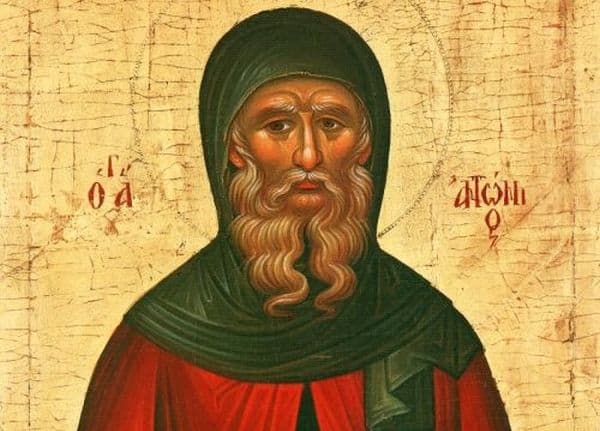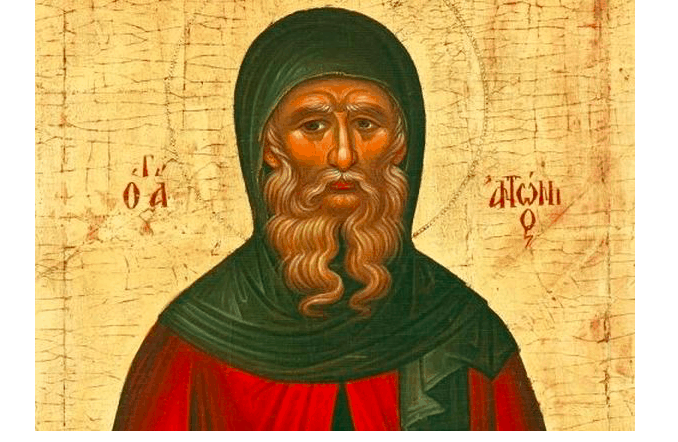
On January 17 the Greek Orthodox Church celebrates the Feast Day of Agios Antonios O Megas, the Anchorite of Egypt and the Father of all Monks.
Saint Anthony was born near Herakleopolis Magna in Upper Egypt in 251 A.D. to wealthy parents. When he was eighteen years old, his parents died and left him with the care of his unmarried sister. In 285 A.D., he decided to follow the words of Jesus who has said: "If you want to be perfect, go, sell what you have and give to the poor, and you will have treasures in heaven; and come, follow Me" (St. Matthew 19:21). Anthony gave his wealth to the poor and needy, and placed his sister with a group of Christian virgins.
At the age of twenty, consecrated himself to the life of asceticism that he had desired from childhood. At first, he lived near his own village but then, in order to escape the disturbance of men, went off into the desert, on the shores of the Red Sea, where he spent twenty years as a hermit in company with no-one but God, in unceasing prayer, pondering and contemplation, patiently undergoing inexpressible demonic temptations.
According to Saint Athanasius, the devil fought Saint Anthony by afflicting him with boredom, laziness (akedia), and the phantoms of women, which he overcame by the power of prayer, providing a them for Christian art. After that, he moved to a tomb, where he resided and closed the door on himself, depending on some local villagers who brought him food. When the devil perceived his ascetic life and his intense worship, he was envious and beat him mercilessly, leaving him unconscious. When his friends from the local village came to visit him and found him in this condition, they carried him to a church.
After he recovered, he made a second effort and went back to the desert, further out, to a mountain by the Nile, called Pispir, now Der El Memun, opposite Arsinoe in the Fayyum. There he lived strictly enclosed in an old abandoned Roman fort for some twenty years. According to Saint Athanasius, the devil again resumed his war against Saint Anthony, only this time the phantoms were in the form of wild beasts, wolves, lions, snakes, and scorpions. They appeared as if they were about to attack him or cut him into pieces. But the Saint would laugh at them scornfully and say, "If any of you have any authority over me, only one would have been sufficient to fight me." At his saying this, they disappeared as though the smoke, and God gave him the victory over the devil. While in the fort he only communicated with the outside world by a crevice through which food would be passed and he would say a few words. Saint Anthony would prepare a quantity of bread that would sustain him for six months. He did not allow anyone to enter his cell: whoever came to him, stood outside and listened to his advice.
Then one day he emerged from the fort with the help of villagers to break down the door. By this time most had expected him to have wasted away, or gone insane in his solitary confinement, but he emerged healthy, serene, and enlightened. Everyone was amazed he had been through these trials and emerged spiritually rejuvenated. He was hailed as a hero and from this time forth the legend of Saint Anthony began to spread and grow. Around him gathered many disciples whom he, by word and example, placed on the path of salvation.
In 85 years of ascetic life, he went only twice to Alexandria: the first time to seek martyrdom during a time of persecution of the Church, and the second at the invitation of Saint Athanasius, to refute Arian heresy.
The back-story of one of the surviving epistles, directed to Constantine I recounts how the fame of Saint Anthony spread abroad and reached Emperor Constantine. The Emperor wrote to him, offering him praise and asked him to pray for him. The brethren were pleased with the Emperor's letter, but Saint Anthony did not pay any attention to it, and he said to them, "The books of God, the King of Kings and the Lord of Lords, commands us every day, but we do not heed what they tell us, and we turn our backs to them." Under the persistence of the brethren who told him, "Emperor Constantine loves the Church," he accepted to write him a letter blessing him, and praying for the peace and safety of the empire and the Church.
When Saint Anthony felt that the day of his departure from this life had approached, he commanded his disciples to give his staff to Saint Macarius, and to give one sheepskin cloak to Saint Athanasius and the other sheepskin cloak to Saint Serapion, his disciple. He further instructed his disciples to bury his body in an unmarked, secret grave, lest his body becomes an object of veneration. He stretched himself to the ground and gave up his spirit. Saint Anthony the Great lived for 105 years and departed on the year 356 A.D.
His biography was written by Saint Athanasius and titled Life of Saint Anthony the Great. Many stories are also told about him in various collections of sayings of the Desert Holy Fathers.
Saint Anthony (Antonios) and Saint Paul the Hermit are seen as the founders of Christian Monasticism. Saint Paul the Hermit is lauded by Saint Anthony as the first hermit. The Monastery of Saint Paul the Hermit exists to this day in Egypt. Saint Anthony himself provided the example that others would follow (i.e., Saint Pachomius). And, although Saint Anthony the Great was illiterate he was, as a counselor and teacher, one of the most educated men of his age, as also was Saint Athanasius the Great.
Saint Athanasius says of him that “his countenance had a great and wonderful grace. This gift also he had from the Saviour. For if he were present in a great company of monks, and anyone who did not know him previously wished to see him, immediately coming forward he passed by the rest, and hurried to Anthony, as though attracted by his appearance. Yet neither in height nor breadth was he conspicuous above others, but in the serenity of his manner and the purity of his soul.”
Many miracles are attributed to this religious father. His fame reached even Constantinople. Constantine the Great and one of his sons would write letters to Saint Anthony asking for his blessing and advice.
Saint Anthony died on January 27 in 356 AD at the age of 105 on He instructed two of his monks to bury him secretly. This they did, and his resting place is still unknown.
Today is also the Name Day of Antonios, Antonia, Theodosios, Theodosia.
Xronia Polla!

